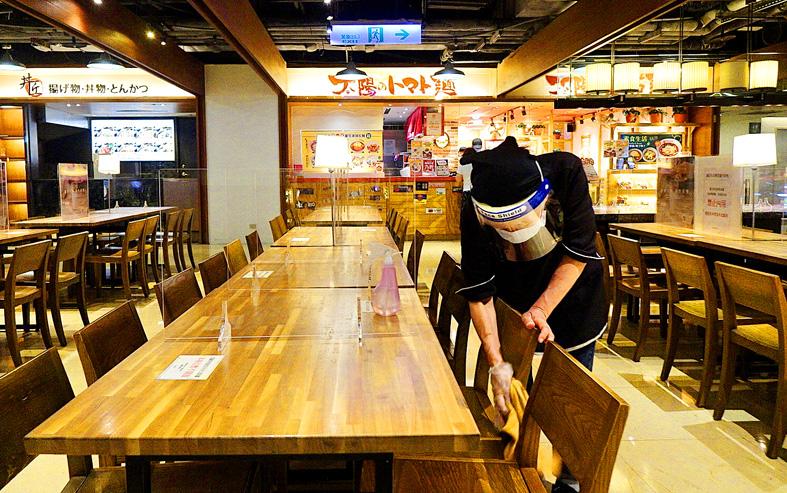Restaurants, night market food vendors and food courts in Taipei, New Taipei City and Yilan County can accept dine-in customers from today, provided that they strictly adhere to disease prevention regulations.
Restaurants elsewhere in Taiwan resumed dine-in services on Tuesday last week when the Central Epidemic Command Center lowered the COVID-19 alert to level 2.
Taipei and New Taipei City cooperated on the decision to lift the dine-in ban as residents frequently travel between the two cities, New Taipei City Mayor Hou You-yi (侯友宜) said yesterday.

Photo: Peter Lo, Taipei Times
The Yilan County Government later yesterday also announced it would lift the ban from today.
However, Hou said that New Taipei City could reimpose the dine-in ban if the Delta variant of SARS-CoV-2 spreads or there is a surge in domestic cases, adding that people should wear masks in public places.
If a restaurant has workers or customers who contract the virus, it would be ordered to suspend operations for three days and would not be permitted to accept dine-in customers for 11 days after it resumes operations, Taipei Mayor Ko Wen-je (柯文哲) said.
Restaurants, night market food vendors and food courts in Taipei and New Taipei City should strictly adhere to disease prevention regulations, the two city governments said, adding that eateries should arrange checkerboard seating for diners or place partitions on tables.
Should dine-in customers wish to share their meals, service personnel should divide each dish into small portions before serving it to customers, they said.
The number of indoor customers should be capped at 50 and outdoor customers should be capped at 100.
If restaurants want to accommodate more customers, they must implement measures to separate customers, and ensure that they enter and exit separately, the Taipei City Government said, adding they must also seek approval from the Taipei Department of Health.
Dining areas should be adequately ventilated, with tables being at least 1.5m apart, and food service providers must monitor their health daily, it added.
Dine-in customers at night markets must not share food or eat at the counter, the New Taipei City Government said, adding that customers are banned from eating while walking or they would be fined NT$3,000 to NT$15,000.
Meanwhile, sports centers, gyms, the Bali Aquatics Center and the Jonjiao Bay Surf Center would also reopen today, but swimming pools and shower facilities would remained closed, the New Taipei City government said.
Shrimp fishing ponds and claw machine stores would also be allowed to reopen today, the city governments said.

INVESTIGATION: The case is the latest instance of a DPP figure being implicated in an espionage network accused of allegedly leaking information to Chinese intelligence Democratic Progressive Party (DPP) member Ho Jen-chieh (何仁傑) was detained and held incommunicado yesterday on suspicion of spying for China during his tenure as assistant to then-minister of foreign affairs Joseph Wu (吳釗燮). The Taipei District Prosecutors’ Office said Ho was implicated during its investigation into alleged spying activities by former Presidential Office consultant Wu Shang-yu (吳尚雨). Prosecutors said there is reason to believe Ho breached the National Security Act (國家安全法) by leaking classified Ministry of Foreign Affairs information to Chinese intelligence. Following interrogation, prosecutors petitioned the Taipei District Court to detain Ho, citing concerns over potential collusion or tampering of evidence. The

Seventy percent of middle and elementary schools now conduct English classes entirely in English, the Ministry of Education said, as it encourages schools nationwide to adopt this practice Minister of Education (MOE) Cheng Ying-yao (鄭英耀) is scheduled to present a report on the government’s bilingual education policy to the Legislative Yuan’s Education and Culture Committee today. The report would outline strategies aimed at expanding access to education, reducing regional disparities and improving talent cultivation. Implementation of bilingual education policies has varied across local governments, occasionally drawing public criticism. For example, some schools have required teachers of non-English subjects to pass English proficiency

NEGOTIATIONS: The US response to the countermeasures and plans Taiwan presented has been positive, including boosting procurement and investment, the president said Taiwan is included in the first group for trade negotiations with the US, President William Lai (賴清德) said yesterday, as he seeks to shield Taiwanese exporters from a 32 percent tariff. In Washington, US Trade Representative Jamieson Greer said in an interview on Fox News on Thursday that he would speak to his Taiwanese and Israeli counterparts yesterday about tariffs after holding a long discussion with the Vietnamese earlier. US President Donald Trump on Wednesday postponed punishing levies on multiple trade partners, including Taiwan, for three months after trillions of US dollars were wiped off global markets. He has maintained a 10 percent

TRADE: The premier pledged safeguards on ‘Made in Taiwan’ labeling, anti-dumping measures and stricter export controls to strengthen its position in trade talks Products labeled “made in Taiwan” must be genuinely made in Taiwan, Premier Cho Jung-tai (卓榮泰) said yesterday, vowing to enforce strict safeguards against “origin laundering” and initiate anti-dumping investigations to prevent China dumping its products in Taiwan. Cho made the remarks in a discussion session with representatives from industries in Kaohsiung. In response to the US government’s recent announcement of “reciprocal” tariffs on its trading partners, President William Lai (賴清德) and Cho last week began a series of consultations with industry leaders nationwide to gather feedback and address concerns. Taiwanese and US officials held a videoconference on Friday evening to discuss the